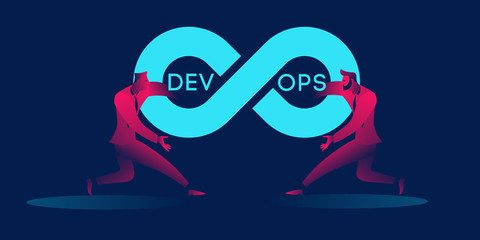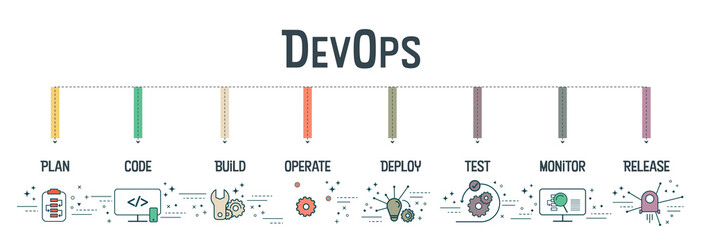Introduction to DevOps 🚀
 Himanshu Rathi
Himanshu Rathi
The term “DevOps” was introduced by combining software “development” (Dev) and “operations” (Ops).
DevOps is more than just a job title or a toolbox; it's a vibrant culture that brings development and operations teams to work better together. The key is automating the whole process of making software – from creating the code to testing, putting it into action, and keeping an eye on it. It's like making everything smoother and faster in the world of software! 🚀
1. What is DevOps? 🔄
DevOps is a culture that thrives on collaboration between development and operation teams. It's not merely a set of tools but a mindset shift aiming to improve efficiency, reduce errors, and enhance product quality. From coding and source control to deployment and ongoing maintenance, DevOps encompasses the entire software development lifecycle.
2. What is Automation, Scaling, Infrastructure 🛠️
Automation:
Definition: Automation is the process of using technology to perform tasks without human intervention.
Example*: Imagine a bakery where a machine automatically mixes ingredients, kneads the dough, and even bakes the bread. In DevOps, automation streamlines repetitive tasks in software development, ensuring faster and error-free processes.*
Scaling:
Definition: Scaling involves adjusting the capacity of a system to handle an increasing workload.
Example*: Picture a ride-sharing app during rush hour. As more people request rides, the app seamlessly scales to accommodate the increased demand. Similarly, in DevOps, scaling ensures that software systems can handle varying workloads efficiently.*
Infrastructure:
Definition: Infrastructure refers to the underlying components and facilities required for the operation of software.
Example*: Think of a city's infrastructure with roads, bridges, and utilities. In DevOps, infrastructure as code (IaC) treats infrastructure elements like software, enabling efficient management and scalability.*
3. Why DevOps is Important 🌟
DevOps is paramount for several reasons:

Collaboration and Communication 🤝
Enhanced Collaboration: DevOps fosters teamwork and communication between development and operations teams, breaking down silos.
Example*: In a traditional setup, developers might create code without considering operational challenges. With DevOps, they collaborate with operations to address concerns early on, resulting in smoother processes.*
Efficiency and Speed ⚡
Faster Development: Automation accelerates tasks, allowing faster development cycles.
Example*: Without DevOps, manual deployment processes might cause delays. With automation, developers can swiftly deploy updates, ensuring a speedier release of features or fixes.*
Continuous Improvement 🔄
Iterative Development: DevOps encourages continuous feedback and improvement throughout the development lifecycle.
Example*: In a non-DevOps scenario, identifying and fixing issues might take a long time. DevOps enables quick feedback loops, helping teams continuously enhance their products*.
In essence, DevOps is a transformative culture that not only streamlines processes but also nurtures a collaborative and efficient environment. By embracing automation, scaling, and infrastructure as key pillars, DevOps empowers teams to deliver high-quality software at an unprecedented pace. So, let's embark on the DevOps journey, where collaboration meets innovation for a brighter, faster, and error-free future! 🚀
This marks the end of our first day of the 360° DevOps-Data Engineering series. In the upcoming sessions, we'll delve into more advanced topics such as Linux, Git, Docker, Jenkins, Kubernetes, AWS, and Python, examining how they fit into the DevOps realm. We'll also explore Azure, SQL, advanced Python, and their applications in the Data Engineering world.
Stay tuned for more insights, and don't forget to keep practicing! 🚀
Happy Learning! 😊
Stay connected to my latest insights and articles on the Data Engineering ☁️🛠️ and DevOps ♾️. Follow me on Hashnode and connect on LinkedIn: Himanshu Rathi's LinkedIn
Thank you for your time! Your support is truly appreciated. Let's continue our journey of learning, growing, and making a positive impact in the tech world together. 🌐🚀
Subscribe to my newsletter
Read articles from Himanshu Rathi directly inside your inbox. Subscribe to the newsletter, and don't miss out.
Written by

Himanshu Rathi
Himanshu Rathi
I am an end-to-end Full Stack Data Engineer who can set up infrastructures, design the architecture, build data pipelines, and productionalize with DevOps. I have spent more than 9 years working as a Data Architect/Engineer and have a proven record of taking multi-petabyte workloads to production while ensuring minimum operational burden. My goal is to simplify the complexities of Big Data and share insights on DevOps, data architecture, Python, SQL, salary negotiation, and financial literacy in an easy-to-understand way :)